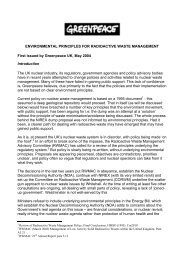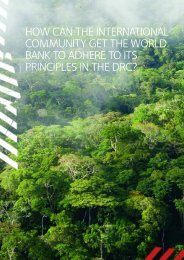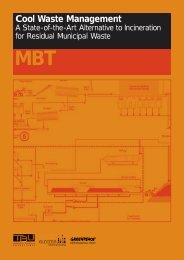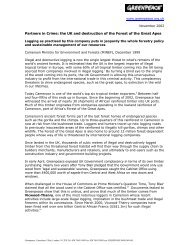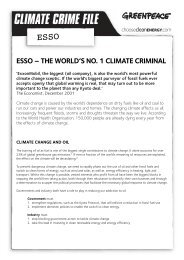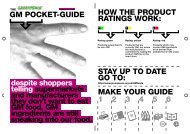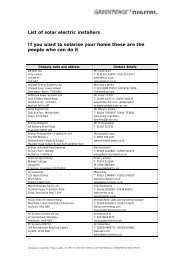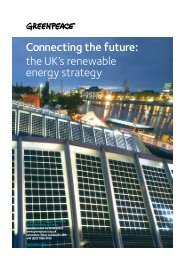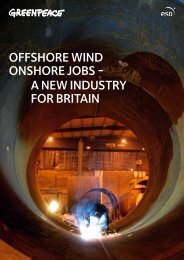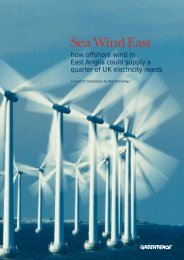EATING UP THE AMAZON 1
EATING UP THE AMAZON 1
EATING UP THE AMAZON 1
You also want an ePaper? Increase the reach of your titles
YUMPU automatically turns print PDFs into web optimized ePapers that Google loves.
<strong>EATING</strong> <strong>UP</strong><br />
<strong>THE</strong> <strong>AMAZON</strong><br />
49<br />
CONTROLLING INDUSTRY<br />
– how the market can help<br />
control deforestation<br />
Unlike its competitors, Brazil is not running<br />
out of land. Agriculture occupies 60m<br />
hectares now; it could stretch out to<br />
another 90m hectares without touching<br />
the Amazon rainforest.<br />
Silvio Crestana, Director of Embrapa,<br />
Brazil’s main agricultural research institute 284<br />
Global market forces are key drivers of the deforestation of<br />
the Amazon and other forests. Soya is just one of the latest<br />
commodities driving this clearance. Others may follow.<br />
The soya industry sees the Amazon rainforest as a cheap<br />
source of land, often aquired through illegal land grabs. The<br />
exploitation of workers – including the use of slaves – reduces<br />
labour costs to a vanishing point. Combined with the large<br />
corporate incentives being pumped into the country from<br />
Cargill and other multinationals, these factors have made soya a<br />
boom industry in Brazil, and a cheap commodity for the world.<br />
The market needs to share responsibility for this criminal advance<br />
of agriculture into the world’s threatened ancient forests, and take<br />
urgent action to end its role in fuelling destruction.<br />
Within Brazil, it is possible to buy soya free from environmental or<br />
social injustices. Further, experts are confident that the country<br />
could meet international demand for non GM soya without<br />
expanding the industry into the Amazon.<br />
For this to succeed however, the market needs to put policies in<br />
place to address the environmental and social impact of industries<br />
right down the supply chain. This means that big food processors,<br />
supermarkets and fast food retailers in Europe need to ensure that<br />
the origin of the soya used in animal feed is not from within the<br />
Amazon biome, is not GM, and that its production complies with<br />
Brazilian labour laws and international human rights.<br />
Traceability of soya (and other commodities) is clearly vital.<br />
Independently verified chain-of-custody schemes allow<br />
supermarkets and fast food retailers to connect their products<br />
with responsible production and avoid being complicit in<br />
environmental and social crimes (see Annex 1).<br />
RETHINKING AGRICULTURE<br />
– bringing home the problem<br />
and creating a solution<br />
When your priority is to get the cheapest soya globally<br />
– or other feed input – you also buy habitat destruction,<br />
social conflict and fuel climate change.<br />
The problem of getting cheap protein to feed factory<br />
farmed animals has been creating environmental and<br />
social conflicts for the last 40 years.<br />
Until the collapse of the fishery in the 1970s, Peruvian<br />
anchovy was one of the largest sources of animal feed<br />
protein for the European market. 285 The market shifted<br />
from mining the oceans to rendering animal carcasses.<br />
When this market collapsed because of mad cow disease<br />
(BSE), the feed sector increased dependence on soya<br />
which has driven its expansion in sensitive habitats on a<br />
global level.<br />
European governments, banks and the food industry<br />
must re-examine their agriculture policies and support<br />
more environmentally responsible and socially just ways<br />
of meeting food and farming needs without damaging<br />
rainforests or the climate.<br />
Long term solutions to the social, economic and<br />
environmental problems of the industry would be to<br />
reverse the current trend of intensive factory farmed<br />
meat production with its reliance on global trade in<br />
cheap commodities.<br />
Social responsibility –whether it be corporate, political<br />
or financial – needs to be meaningful if we are to tackle<br />
these challenges head on. Governments, banks, and the<br />
food industry need to support more extensive meat<br />
production strategies, encouraging the production of<br />
feed close to point of use if not on the farm.<br />
Brazil and European countries need to re-examine<br />
agriculture policies and support only environmentally<br />
responsible ways of meeting food and farming needs<br />
without damaging rainforests or the climate and<br />
without introducing the additional problems caused<br />
by the use of GM crops.


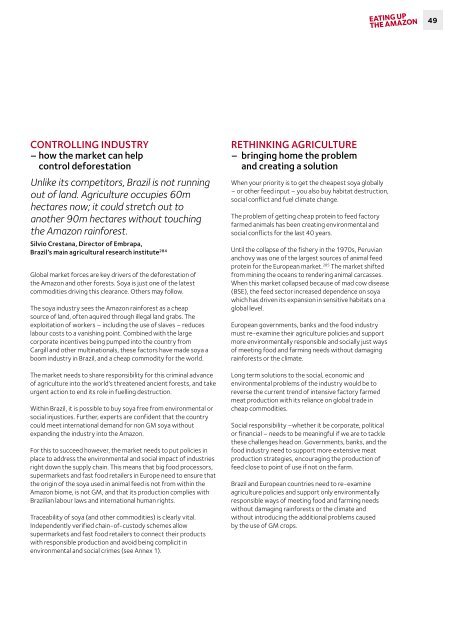
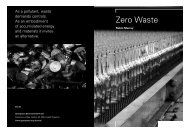
![[2007] EWHC 311 - Greenpeace UK](https://img.yumpu.com/22079793/1/184x260/2007-ewhc-311-greenpeace-uk.jpg?quality=85)

